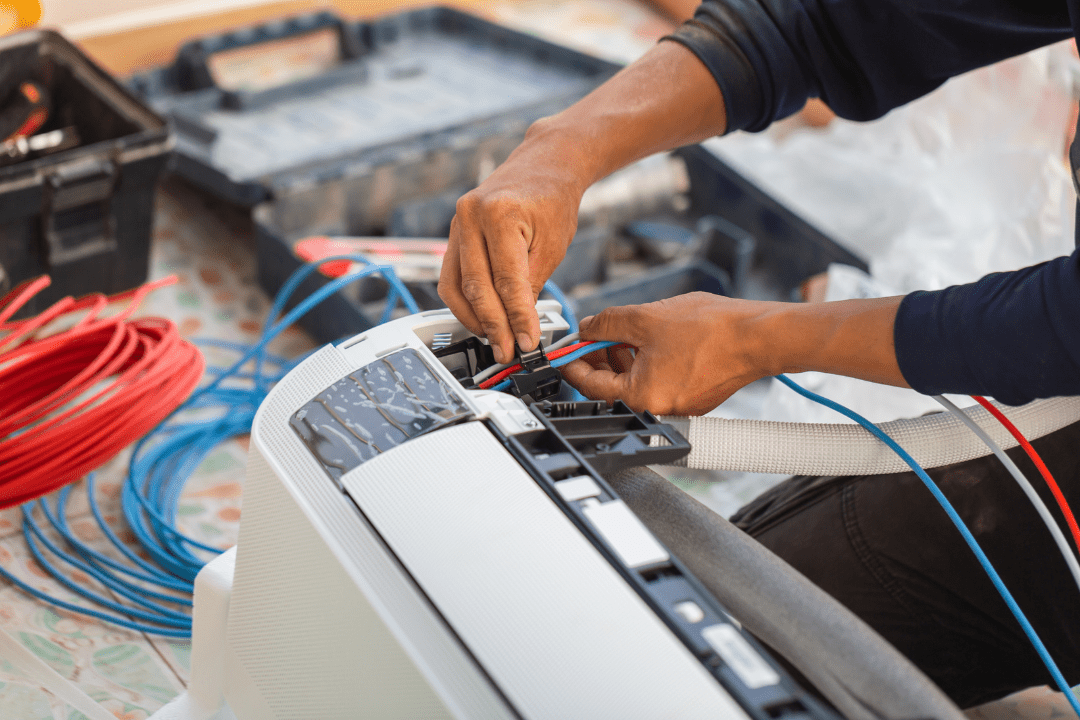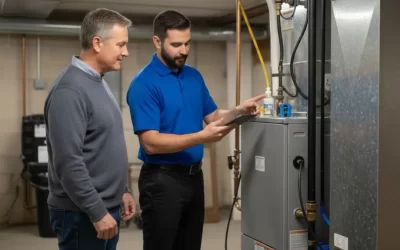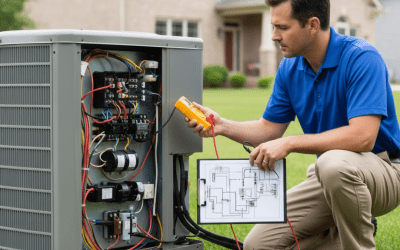Whenever you experience frigid temps this winter or scorching heat next summer, your AC system becomes your most important home resource. But what would you do if it started to show signs of malfunctioning, like a sudden hike in your electricity bills, strange noises, or frequent breakdowns? All of these could be signs that your air conditioner needs your attention. But this leaves you with a crucial question: should you repair your AC unit or replace it altogether? In this blog, we’ll explore the key indicators that differentiate a repairable issue from one that signals it’s time for an upgrade. By weighing the practical benefits of repairing versus replacing, we’ll guide you toward a decision that best fits your comfort, budget, and long-term needs.
Signs Your AC Needs Repair
Electrical appliances show clear signs when they need repairs. If you notice any issues with your AC, be sure to have it checked by a professional:-
Strange Noises:
Any unusual sound, such as grinding, squeaking, or clanking, is often a sign to get your AC checked, as these are often signals of a mechanical issue. A grinding noise may indicate a motor bearing failing, whereas a squeaking sound may suggest the fan belt has worn out. All these issues should be taken care of immediately to prevent further damage.
Frequent Cycling:
If your AC keeps turning off and on frequently, this may be an issue with the thermostat or air filter. A short cooling cycle can put an additional load on your system, leading to overheating and further damage.
Warm Air Blowing (During Summer):
There could be an issue with the refrigerant level, compressor, or thermostat if your AC is blowing warm air when you need it to be cooling. If the refrigerant is running low it may cause the AC to lose the cooling efficiency.
Bad Odor:
Take notice if your AC has a burning or musty smell. Musty smells can be a sign of mold and mildew in your appliance caused by moisture-trapped or clogged condensate drains. On the other hand, burning smells can indicate an electrical issue or overheating of a part.
Water Leakage:
If you notice water pooling near your AC or water dripping from it, this could be a sign of a clogged condensate drain or a refrigerant leak. This issue can cause severe water damage and other issues in your AC.
Increased Electricity Bills:
A sudden increase in your electricity bill can indicate your AC is not working properly. This may be due to various factors like low refrigerant levels, dirty coil, or even poor maintenance.
Wondering whether to repair or replace? Weigh costs, performance, and long-term value.
Signs Your Air Conditioner Needs Replacement
There are many signs which show that your air conditioner needs replacement, and we have mentioned some of them here:
AC Unit Is Too Old:
Usually, air conditioners last for over 10 to 15 years with proper care and maintenance. If your AC is older than 15 years and losing its efficiency, it is more likely that the major points like the compressor, coils, and motor are failing which are signs that you need a new AC unit. Replacement of these parts might cost you less on decision day, but could cost you much more in the long run with higher utility costs and more frequent and costly repairs as you try to get more life out of a really old system. Replacement can save you a lot of money over time.
Compressor Failure:
When your air conditioner’s compressor fails, it can cause a complete system breakdown since the compressor circulates refrigerant. Replacing a faulty compressor is expensive, and if your AC and compressor have endured significant wear and tear, investing in a new unit is often the better option.
Frequent Breakdowns and Costly Repair:
If you are facing frequent breakdowns and costly repairs every time, it is more likely that your appliance is nearing the end of its useful life. Getting a new AC would be a better option. The cost of your regular AC repairs can eventually exceed the cost of a new air conditioner. Plus, a new AC will come with a warranty that will give you far fewer problems and greater peace of mind.
Inconsistent Cooling:
If you have regular maintenance and some of your rooms are hotter than others when set to the same temperature, your system may have inadequate refrigerant or worn-out internal parts. This can cause your AC to overheat and eventually sustain more significant damage. This is a clear sign that it’s time to replace your old AC with a new one.
Comparing Cost: Upgrading vs Repairing Your AC
The average cost of a minor repair can cost anything from $150 to $600, but it can go to even $2000 or higher for a major repair. Common issues like refrigerant leaks and capacitor replacement fall under these circumstances and the cost for their repair varies depending on any associated damage. On the other hand, the replacement cost can be between $3000 to $7500, depending on your requirements, which seems like a big investment but pays off in the long run. The AC installation and labor costs may vary depending on your location.
Additionally, according to the SEER rating of seasonal energy efficiency, an AC’s cooling is relative to its energy consumption. The new ACs have a SEER rating of 14 or higher, whereas the older ones can have a rating of 10 or less. An AC with a higher rating can reduce your bills by 20% to 40%.
Factors to Consider Before Making a Decision
It is suggested that you decide whether to get your AC repaired or replaced after thinking about the following factors:
- The 50% Rule: We suggest you apply a 50% rule while making a decision, which means if the cost of your repairs over 2-3 years is more than 50% of the cost of a new appliance, it is wiser to replace your AC system with a new one. It is more advantageous in the long run as it provides you the satisfaction of having to deal with fewer unexpected breakdowns, greater energy efficiency, and improved air quality.
- Consider Your Move Plans: A new appliance will last you almost 15 to 20 years and effectively pay you back in the form of lower electricity bills, less frequent maintenance and repair charges, and quality of cooling in less amount of time. However, if you are thinking about moving in a few months, replacement might not be the best option.
- Rust and Corrosion Issues: Rust and corrosion are said to be the cancer of your electrical appliances; they greatly degrade your appliance over time and cause you bigger problems. So, if your AC has a major structural problem like this, it is better to replace it with a new one. If your external structure is in good condition but some parts are damaged, you can get those parts repaired or replaced.
- Discontinued Spare Parts: As your AC ages, finding compatible replacement parts can become challenging if they are no longer produced. In such cases, investing in a new unit may be better to ensure optimal performance and air quality. One of the benefits of upgrading to a newer AC system is improved energy efficiency, which can lead to lower utility bills and reduced environmental impact. Additionally, newer models often come with advanced features that enhance comfort and air quality, making the upgrade a smart choice for long-term savings and improved indoor environments.
Get Expert Help for Your AC Decision
Ultimately, the right decision will depend on your specific situation, but weighing the cost of repairs, the age of your unit, and the benefits of a more energy-efficient system will guide you toward the most beneficial choice. If you are still unsure about when to upgrade your air conditioner, it’s always a good idea to consult with professionals who can provide an expert assessment. At Classic Services Air Conditioning and Heating, we specialize in providing the best air conditioners and AC repair in Boerne, TX, and will help you to find the ideal one that perfectly aligns with your needs. From expert advice to professional installation and maintenance, we have got everything you need.






